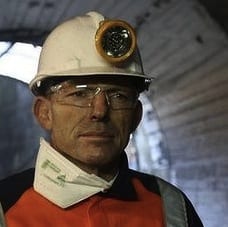This is one carbon budget that Australia has already blown. Economist and climate change advisor Professor Ross Garnaut has delivered a withering critique of Australia’s economic policies and investment patterns, saying the cost of misguided over-investment in the recent mining boom would likely outweigh the cost of climate action over the next few decades.
 In a submission to Prime Minister Tony Abbott’s task-force that is looking at the scope of Australia’s future emissions reduction targets, Garnaut says Australia has invested heavily in mining infrastructure and mining projects on the presumption that other countries would take no action on climate, or on curbing the use of fossil fuels.
In a submission to Prime Minister Tony Abbott’s task-force that is looking at the scope of Australia’s future emissions reduction targets, Garnaut says Australia has invested heavily in mining infrastructure and mining projects on the presumption that other countries would take no action on climate, or on curbing the use of fossil fuels.
He says the cost of these over-investments just in the last few years probably outweighs the total cost of climate action to the middle of the century if Australia had pulled its weight on a global effort to limit global warming to an average 2°C.
But that bet has been proved wrong.
“Hopes that other countries would not take action to reduce the costs of climate change has contributed to the misjudgments that caused overinvestment in Australian resources production capacity over the past four years,” Garnaut writes.
“Failure to recognise the seriousness of other countries’ commitments to reduce emissions, most importantly China and the United States, has imposed large costs on the Australian economy.
“The total of these unnecessary costs may already exceed what would have been the cost to the middle of the century of timely implementation of Australia’s share of a global mitigation effort directed at holding temperature increase to two degrees.”
Garnaut agrees with the independent Climate Change Authority that Australia’s 2020 target should be increased from its current 5 per cent reduction on 2000 levels (including a Kyoto credit bonus that makes up 4 per cent), to a target of a 15 per cent cut by 2020 (not including the Kyoto bonus).
The post 2020 target should be set at the very minimum at minus 27.5 per cent by 2025, and minus 40 per cent by 2030. He said this equated to the lowest rate of reductions that would avoid placing unreasonable burdens on future Australians; and are broadly in line with the targets of comparable countries.
Garnaut said a more even adjustment would require a target of minus 40 per cent in 2025 and a cut of more than 50 percent by 2030.
Garnaut’s comments come as the G7 prepares to hold a major meeting this weekend , with a focus on climate policy, ahead of two weeks of UN-sponsored talks in Bonn, which will help lay the framework for a global agreement in Paris later this year. It also comes amid a major lobbying campaign to prevent banks – or governments – from financing the massive coal mine developments and associated infrastructure proposed for Queensland.
The Abbott government is yet to spell out its post 2020 targets, despite numerous countries already doing so. It has suggested that the CCA proposals will create too much of a burden, and has insisted that its Direct Action policy – and using taxpayer funds to buy pollution abatement from industry – will form the heart of its policy.
This, however, has been decried as ridiculously expensive by almost all analysts. This week, it was revealed that most of the projects funded in the first auction of the Emissions Reduction Fund already existed. In short, it bought little new abatement. Labor has vowed to go to the next election with a new carbon price proposal, and has brought in climate change minister Greg Combet and former Treasury Secretary Ken Henry to help.
Garnaut said a 19 per cent cut by 2020 could be low-cost – just 0.02 per cent age points off their rate of economic growth – if the most efficient policies were adopted.
Failure to set a meaningful target would not only be a breach of domestic political and international commitments, it would also create economic problems for the future.
“The longer term targets that represent our fair share of the global effort are not diminished by weak early efforts. Accelerating emissions reductions after 2020 to catch up on slow early action would increase the costs of adjustment for Australians in future.
In addition, slow early action by Australia and other countries to the need for convergence toward near-zero emissions at an earlier date than would otherwise be the case, and would lead to earlier exhaustion of the “carbon budget” that is consistent with holding temperature increases to two degrees.”







